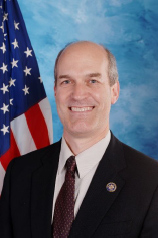U.S. Representative Rick Larsen visits Friday Harbor; addresses marine infrastructure, cost of living, affordable housing, and the war in Ukraine
Posted May 2, 2022 at 11:47 am by Jeff Arnim
 Congressman Rick Larsen and his staffers visited Friday Harbor on Saturday to meet with local government and nonprofit leaders and hold the first San Juan County event for the 2022 campaign cycle.
Congressman Rick Larsen and his staffers visited Friday Harbor on Saturday to meet with local government and nonprofit leaders and hold the first San Juan County event for the 2022 campaign cycle.
After arriving late due to a delayed ferry sailing, Larsen first met with Friday Harbor town officials to learn about the impacts of last month’s arson on downtown. He later discussed affordable housing issues with the Opportunity Council, San Juan County’s Department of Health & Community Services, and the San Juan Community Home Trust. Larsen then met with constituents at a 2022 campaign kick-off event held at Friday Harbor House.
The San Juan Update caught up with Larsen to discuss a handful of issues of concern to island constituents, including marine infrastructure, the future of the expanded child tax credit, legislative priorities for the rest of 2022, inflation, the war in Ukraine, and the state of bipartisanship in Washington, D.C.
Marine infrastructure is a major issue in the San Juan Islands. The state ferry fleet is aging and has an extensive maintenance backlog, and docks and landings that other vessels use to bring critical goods to the islands are crumbling. In what ways do you expect the trillion-dollar infrastructure package that was signed into law last November to improve this county’s marine infrastructure?
It could, but I won’t make a promise. When you’re looking at the ferry system, the state government deals with the planning for what the ferry landings will be and what the timeline for investment is going to be. But for the Port of Friday Harbor and the other ports — Port of Orcas, Port of Lopez — it’s easier to access those dollars for the smaller jurisdictions. I met with Victoria Compton today, the Friday Harbor Port Commissioner, about the barge access and landing at Jensen’s, which helps get goods onto San Juan Island. There’s the Port Infrastructure Development Program, or PIDP, and that’s probably that’s one area the local port can look to for federal dollars. I’m also going to pursue an earmark specifically outside of that process for the [Jensen’s] project, because I understand it’s degrading and needs replacement. So that’s an area where we’re local folks can benefit.
For the ferry system, I think it’s really a matter of what your state legislators are able to do and put in priority, but the federal money can be used for terminal development for the development and redevelopment of ferry terminals, as well as for ferries.
Can you talk more about using those funds for the vessels themselves?
There’s a limit, because of the make-it-in-Washington provisions in the state law [which require that new vessels be constructed within the boundaries of the state of Washington.] Unless the state ferry system competes nationally, you can’t get the federal dollars — or you’re limited in what you can do with the federal dollars. That’s the biggest challenge that state ferry system has to accessing federal dollars. But you can pursue terminal dollars, then you can shift the state dollars that you were going to put in terminal development to ferry construction.
I can’t make the state law change, but we can create the programs and put the dollars in those programs for the state to pursue.
It’s financially challenging for working families to raise children in the islands, illustrated by the fact that 36 percent of San Juan Island School District students receive free or reduced lunch. The infrastructure bill that passed the House included a one-year extension of the expanded child tax credit that benefited many island families over the past two years, but that provision did not make it into the final package signed by the president. Do you see a path forward for permanently extending that credit?
The lesson I’ve learned in 22 years in Congress is that the harder you work, the better your odds are. The success of the childcare tax credit is that it reduced child poverty by 40 percent. I think about 11 percent of people use that childcare tax credit for childcare. But like 40 percent — a much higher percentage — used it for food, and for housing, just for basics. Families that had kids got help. So there is a very good argument to extend the child care tax credit. And so I’ll be pursuing that.
We also waived requirements for summer meal programs that were funded for free and reduced lunch programs during the summer, so that any kid could participate. This administration rescinded that waiver, now that we’re through the pandemic. But it’s I think it’s one of those waivers where we need to return to it and say, No, the success of the of the summer meals programs done through our local nonprofit agencies was very successful during the pandemic, it fed kids, and we need to continue that.
So, extend the child care tax credit, reinstate the waiver for the summer meals programs through our local nonprofits — those are a couple things that we can do to help relieve the cost of living for local families. And it’s it’s a challenge here in the San Juans. For every problem that exists in the counties I represent on the mainland, you’ve got to multiply it by some factor here in [San Juan County] and I understand that.
Current polling suggests that Democrats will lose their House majority when the 118th Congress convenes next January. Which legislation do you intend to prioritize for the rest this year, while that majority is still in place, and how will that agenda benefit the residents of San Juan Island?
In 22 years, I’ve been able to pass legislation in the majority and the minority, because my focus has been on trying to get bipartisan support for bills. So in terms of passing legislation, I’m not as concerned whether I’m in a majority of the minority. In terms of supporting working families, and the struggles that people have in San Juan County, I’d be much more concerned if there was a Republican majority, because I think the numbers show — and the actions show — that folks who live in San Juan County aren’t the kinds of folks that that the Republican majority will pay a lot of attention to. And that’s my biggest concern.
That said, what I really need to watch out for is the dollars that are going into supporting affordable housing, because those are the kinds of dollars that a Republican majority will look at and try to cut, when in fact there’s still a tremendous need here in San Juan County. So rather than a piece of legislation, it will be more of a focus on trying to ensure that there’s robust funding for programs that the folks use here to support the development of affordable housing.
Rising inflation is of particular concern here in the islands, where our cost of living was already high. Does Congress have any tools at its disposal to address inflation?
I don’t want to sound negative about Congress, but solving the problem of inflation is largely a Federal Reserve issue, not a congressional issue. It’s hard for people to hear that. But I do think that as members of Congress we need to show we’re trying to do something where we can on costs. One of those areas is giving Medicare the authority to negotiate lower drug prices. I know the population here in San Juan County, I know it well, I know that it’s relatively older, and I know that prescription drug costs are a big issue for folks. So let’s get Medicare what Veterans Affairs has, which is the ability to negotiate lower drug prices. Let’s limit the out of pocket copay costs of insulin to $35. Let’s start there.
You can trace the spike in gas prices to when Putin started his unprovoked invasion in Ukraine. So you can blame Putin for some of the gas price increase. However, gas prices were increasing well before February 24; we need to recognize that as well. The president is now releasing 1 million barrels of oil a day from the Strategic Petroleum Reserve. What that means is they’re to trying to put refined oil out into the market to alleviate high gas prices. And gas prices have stabilized. Unfortunately, they have stabilized right now statewide at about $4.70, but they were 20 cents higher about a month ago.
But when you look at the Brent Crude oil prices, or West Texas Intermediate oil prices, they’re up and down, while the price of gas, that retail [customers] pay stays flat. There’s something sticky about gas prices that needs to get looked at, so that there’s transparency in the market. If you introduce some more transparency, maybe gas prices come down as well. But it’s complex. I pay the same gas prices everyone else is paying, for the record. And I don’t like it either.
The Biden administration has asked Congress for an additional $33 billion to respond to the Russian invasion of Ukraine, more than double what has been authorized so far. What is your position on that request?
I support it, [although] we may argue around the edges about what it ought to go to. When we did the first $13.6 billion, on military aid, for instance, we didn’t say specifically that the administration had to buy X number of Stinger missiles or X number of any number of weapons. But we did define the [general] needs — Ukraine needs anti-tank, they need anti-aircraft, they need these kinds of weapons, these kinds of capabilities — and then the administration went forward and used what we call presidential drawdown authority. It’s very difficult right now for the folks in Ukraine. It’s important that we continue to support the Ukrainian military, the leadership, and the people of Ukraine with economic aid, humanitarian aid, and the military aid — it all needs to continue.
We need to avoid a direct confrontation with Russia. But I think it’s important to understand that it’s pretty clear that Russia and Putin, they want to avoid a direct confrontation with NATO and the U.S. as well. It’s not just us that wants to avoid confrontation; it’s pretty clear that Putin is calculating to try to stay out of our way, face to face. If that were to happen, he knows what would happen to the Russian military; he’d be more embarrassed than he is now.
Some of your constituents, regardless of political affiliation, believe that bipartisanship in Washington D.C. is dying or already dead. Does your experience working with the current Congress reflect that viewpoint?
It’s nowhere near. I can point to several members of Congress that are go-to Republicans that I work with on issues, and I’m one of their go-to Democrats. Now, those are not the issues that folks are going to read about or hear about watching Tucker Carlson, or Sean Hannity, or anyone on MSNBC on the Democratic side of the aisle. But there are plenty of Republicans that I work with on important issues that we think are the things we need to solve.
I’m the chair of the aviation subcommittee. There are a lot of what are called new entrants into the airspace. It’s more than airplanes now — it’s drones, it’s flying taxis, which are a reality and are going to happen. They call it advanced air mobility. Those are issues that are meaty policy issues, and Democrats and Republicans are working together to try to be sure there’s a framework in the future so that we have a safe airspace, that these new entrants don’t run into each other, if you will. That’s an example of how Democrats and Republicans are working together.
The flipside is that we differ on some things. We differ on [the questions of] should people have low hurdles to voting and high penalties if you’ve engaged in voter fraud? I think we should have low hurdles to voting and high penalties to voter fraud. My Republican colleagues don’t. I think that we should not privatize Social Security, or Medicare, and the Senate Republicans already talking about doing both in the future. I think that corporations and the wealthiest Americans should pay more in taxes, or at least their fair share, which they aren’t doing now. And my Republican colleagues, we’re going to disagree on this. Is there a bipartisan solution to those [issues]? I don’t think that there is — they’re diametrically opposed. But I also think that I’m right, and the Democrats are right, on those issues.
You can support the San Juan Update by doing business with our loyal advertisers, and by making a one-time contribution or a recurring donation.
Categories: Around Here
One comment:










One comment...
Rick……I got a kick out of your comment to make Medicare coverage comparable to what the VA covers. Us disabled vets only get Medicare for at least up to the Medicare limits of 80%. But I like to go to bed knowing that someone/thing is profiting from my situation and sacrifice. I am a 100% disabled vet. The VA does not cover Peace Island Health here on San Juan Island, and when I do go the following statement always shows a balance of about 40%. I’ve never seen it show up on my credit report but still, there was an outstanding balance, to which I am offended. Thanks for your service Congessman
By submitting a comment you grant the San Juan Update a perpetual license to reproduce your words and name/web site in attribution. Inappropriate, irrelevant and contentious comments may not be published at an admin's discretion. Your email is used for verification purposes only, it will never be shared.